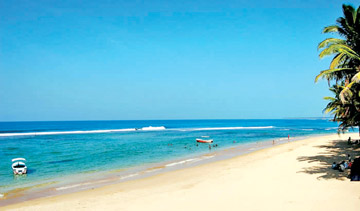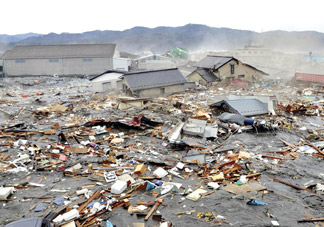|
UN-HABITAT initiative:
Improving climate change resilience of coastal cities
By Anuradha KODAGODA
 To improve resilience to climate change in coastal cities in the
country, the Norwegian Institute for water Research (NIVA) together with
the University of Moratuwa, United Nations Human Settlements Program
(UN-HABITAT), Batticaloa Municipal Council (BMC) and Negombo Municipal
Council (NMC) have launched a project 'Climate Resilient Action Plans
for Coastal Urban Areas, Sri Lanka (CCSL)'. To improve resilience to climate change in coastal cities in the
country, the Norwegian Institute for water Research (NIVA) together with
the University of Moratuwa, United Nations Human Settlements Program
(UN-HABITAT), Batticaloa Municipal Council (BMC) and Negombo Municipal
Council (NMC) have launched a project 'Climate Resilient Action Plans
for Coastal Urban Areas, Sri Lanka (CCSL)'.
The project inauguration workshop was held on November 4 at the
Galadari Hotel Colombo with the participation of the Minister of
Environment Anura Priyadarshana Yapa and the Norwegian Ambassador to Sri
Lanka Hilde Haraldstad.
The project will be implemented during the next twenty months in the
Municipal Council areas of Batticaloa and Negombo.
The project is funded by the Nordic Climate Facility. Climate change
initiatives and strategies from Europe, the Asia Pacific region
including Sri Lanka as well as technical sessions on Climate Resilient
Adaptation Strategies and Supporting Action Plans (CRASAPs) and water
resource management and GIS rapid response systems were introduced by
national and international specialists.
Practitioners on climate change, environment and urban development
from Government agencies, development partners, academia and civil
society participated at the workshop.
Prof. Harsha Ratnaweera, the Director of International Projects of
NIVA said that as most of the coastal cities in Sri Lanka have
experienced climate disasters during the recent years.
This initiative will focus on mitigating climate change risks in
coastal cities through Disaster Risk Management (DRM).
 Further he said that, 70 percent of Sri Lanka's urban population and
80 percent of its economic infrastructure networks are concentrated in
coastal cities which are highly vulnerable to climate change impacts
such the rise in the sea level, flooding, storms, cyclones and droughts. Further he said that, 70 percent of Sri Lanka's urban population and
80 percent of its economic infrastructure networks are concentrated in
coastal cities which are highly vulnerable to climate change impacts
such the rise in the sea level, flooding, storms, cyclones and droughts.
These disasters affect the urban poor communities who have no option
but to live in vulnerable areas. Environment Minister Anura
Priyadharshana Yapa said, "As we are aware the climate change which is
the ultimate outcome of the global warming is now being universally
recognized as the fundamental human development challenge of the twenty
first century.
The intergovernmental panel on climate change has established that
the climate change is taking place and global warming is the direct
result of human action. Global warming increases the concentration of
atmospheric Green House Gases (GHG).
The post-industrial era recorded a marked increase of GHG in the
atmosphere.
Primarily fossil fuel burning and industrial emissions and various
other human actions have contributed to such increases at alarming
levels," the (CCSL) will be a momentous initiative to implement the
adaptation measures in the coastal zone.
This project aims at settling up multi-purpose green belts to protect
the lagoon and the coastal areas, restore the mangrove eco-system and
coastal biodiversity in Batticaloa and Negombo Municipal Council areas;
The process will be replicated in other coastal cities while climate
change resilient approaches will be included in urban planning and
budgetary frameworks," he said.
UN-HABITAT program Manager, Laxman Perera said that the CCSL project
will contribute towards climate change, disaster preparedness of the
cities of Negombo and Batticaloa and that the knowledge and lessons
learned from this project would benefit other coastal cities in
developing a climate resilience action plan. |

